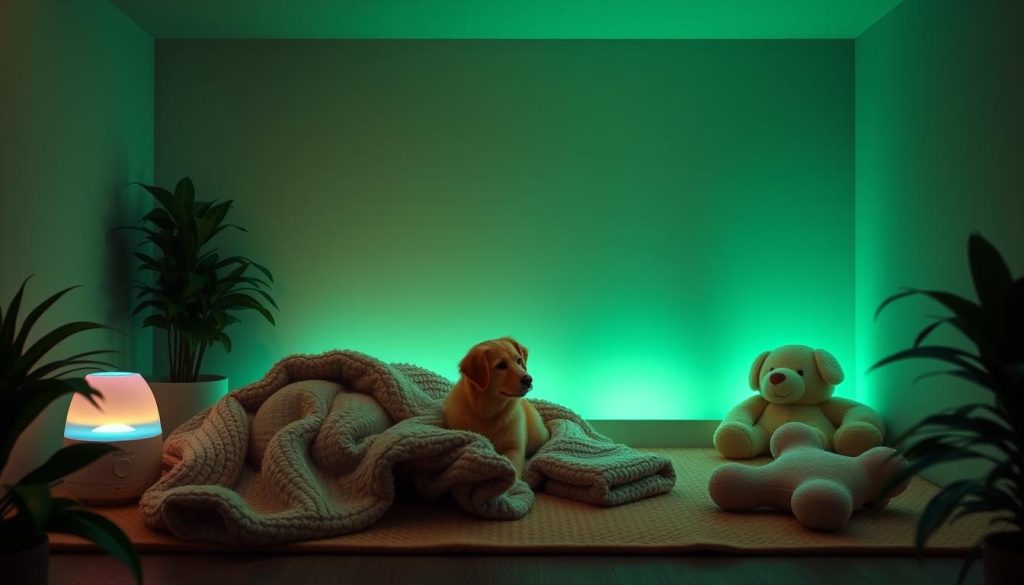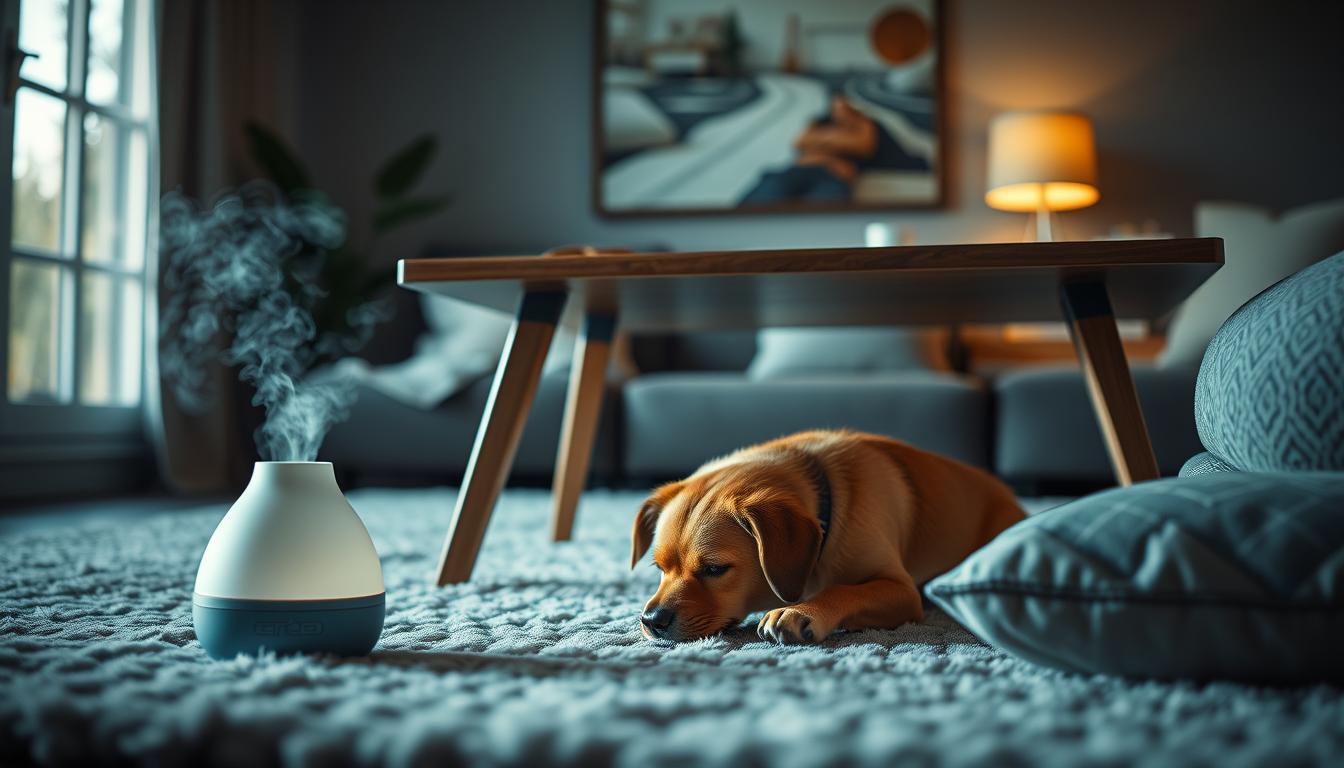I’ve helped many pet owners find ways to calm their anxious pets. In this guide, I’ll share expert tips and strategies. These methods help create a soothing environment and reduce pet anxiety. Whether your pet has separation anxiety, reacts to loud noises, or has other triggers, this article will help.
Pet anxiety is a common issue that affects pets and their owners. Anxious pets may act hyperactively or show physical symptoms. As a pet parent, it’s important to know the signs of anxiety and understand the causes. Then, you can use effective strategies to support your pet.
Recognizing the Signs of Pet Anxiety
Spotting the signs of pet anxiety is key to helping them feel better. Knowing the common changes in behavior and physical signs can help you act fast. This way, you can support your pet effectively.
Common Behavioral Changes
Pets with anxiety often show different behaviors. Some common signs include:
- Excessive barking or whining
- Pacing or restlessness
- Destructive behavior, such as chewing or scratching
- Hiding or avoidance
- Increased clinginess or separation anxiety
Physical Symptoms to Watch Out For
Pets with anxiety may also show physical signs. These can be:
- Panting or rapid breathing
- Trembling or shaking
- Loss of appetite or decreased interest in food
- Excessive grooming or licking
- Accidents in the house
By spotting these signs, you can help your pet feel better. You might need to make changes in their environment or seek professional help. It’s important to address the anxiety to improve your pet’s well-being.
| Behavioral Changes | Physical Symptoms |
|---|---|
| Excessive barking or whining | Panting or rapid breathing |
| Pacing or restlessness | Trembling or shaking |
| Destructive behavior | Loss of appetite |
| Hiding or avoidance | Excessive grooming or licking |
| Increased clinginess | Accidents in the house |
Understanding the Causes of Pet Anxiety

As a pet parent, it’s key to know why your furry friend feels anxious. Pet anxiety can come from many things like changes at home, being left alone, loud noises, or health issues. Knowing the reasons helps us support them better.
Changes at home can really upset pets. This includes moving, renovations, or new family members. Pets like routine and familiarity. Any big change can make them anxious and upset.
Separation anxiety is another big issue. Pets can get very stressed when left alone for a long time. This is tough for owners who work long hours or travel a lot.
Loud noises can also make pets anxious. Sounds like thunderstorms, fireworks, or even loud appliances can scare them. Their sensitive hearing makes them very aware of these loud sounds.
Some pets may feel anxious because of health problems. Issues like thyroid imbalances, arthritis, or dental pain can cause discomfort. It’s important to check with a vet to rule out any health issues.
By understanding the causes of pet anxiety, triggers for pet anxiety, and factors contributing to pet anxiety, we can help our pets feel better. With patience and the right help, we can make a calm space for them.
Creating a Calming Environment for Your Pet

Creating a calm and safe space is key for your pet’s comfort. It helps reduce their anxiety. By adding calming elements to your home, you make a cozy spot for your pet to relax when stressed.
Introducing Soothing Scents and Sounds
Using calming scents and sounds can help your pet relax. Try diffusing lavender or chamomile essential oils. These oils can calm both pets and their owners. Soft music adds to the peaceful atmosphere in your pet’s area.
Providing Safe Spaces and Hiding Spots
Anxious pets need their own safe spots. This could be a cozy crate, a quiet corner, or a cat tree with a hidden spot. These places let your pet take a break and calm down when feeling stressed.
By making a calm space for your pet, you can lessen their stress. This makes them feel safer and more comfortable. It also strengthens your bond with your pet and improves their health.
Pet anxiety: Coping Strategies for Anxious Pets

As pet owners, we face the challenge of caring for anxious pets. Luckily, there are many ways to help them feel better. By using these strategies, we can help our pets manage their anxiety and learn to cope.
Desensitization is one effective method. We slowly introduce our pets to things that scare them in a safe place. This helps them get used to these things and react less over time. Counter-conditioning works by linking the scary thing to something good, like treats or play.
Positive reinforcement is also key. We reward our pets for calm behavior. This encourages them to be calm more often. It also makes our bond with them stronger.
Adding calming activities to our pets’ routines can also help. Gentle exercises, soothing music, and pheromone diffusers can make them feel more relaxed. Creating a cozy, safe space is also important for their well-being.
By using these strategies together, we can help our pets feel safe and happy. With patience and creativity, we can help them overcome their fears and live a better life.
The Benefits of Calming Supplements and Medications
Creating a calm environment and using behavioral strategies are key. But sometimes, pets need more help with calming supplements or medications. These can really help manage anxiety and make pets feel more relaxed and happy.
Calming Supplements for Pets
Calming supplements, like pheromones and natural herbs, are great for pet anxiety. Pheromone products, such as diffusers and collars, mimic natural pheromones. They help pets feel safe and calm. Herbs like chamomile, valerian, and melatonin also have a calming effect on pets.
Prescription Medications for Pet Anxiety
For severe pet anxiety, vets might suggest prescription meds. Antidepressants, anti-anxiety meds, and other therapies can help. They work by fixing the chemical imbalances in the brain that cause anxiety.
Always talk to your vet before giving your pet calming supplements or meds. They can help pick the best option for your pet. This ensures your pet gets the right support they need.
| Calming Supplements for Pets | Prescription Medications for Pet Anxiety |
|---|---|
|
|
Building a Stress-Free Routine for Your Pet
Creating a routine can really help reduce pet anxiety. As a pet owner, I’ve seen how a calming daily routine helps. Regular exercise, playtime, and set schedules for eating and sleeping make my pet feel secure.
Regular exercise is key to a stress-free life for pets. Activities like walks, fetch, or exploring the backyard help. They get to burn off energy and relax better afterwards.
Structured playtime also helps manage pet anxiety. Setting aside times for play gives pets a calm, predictable experience. It can be as simple as tug-of-war, hide-and-seek, or just playing with their favorite toys.

